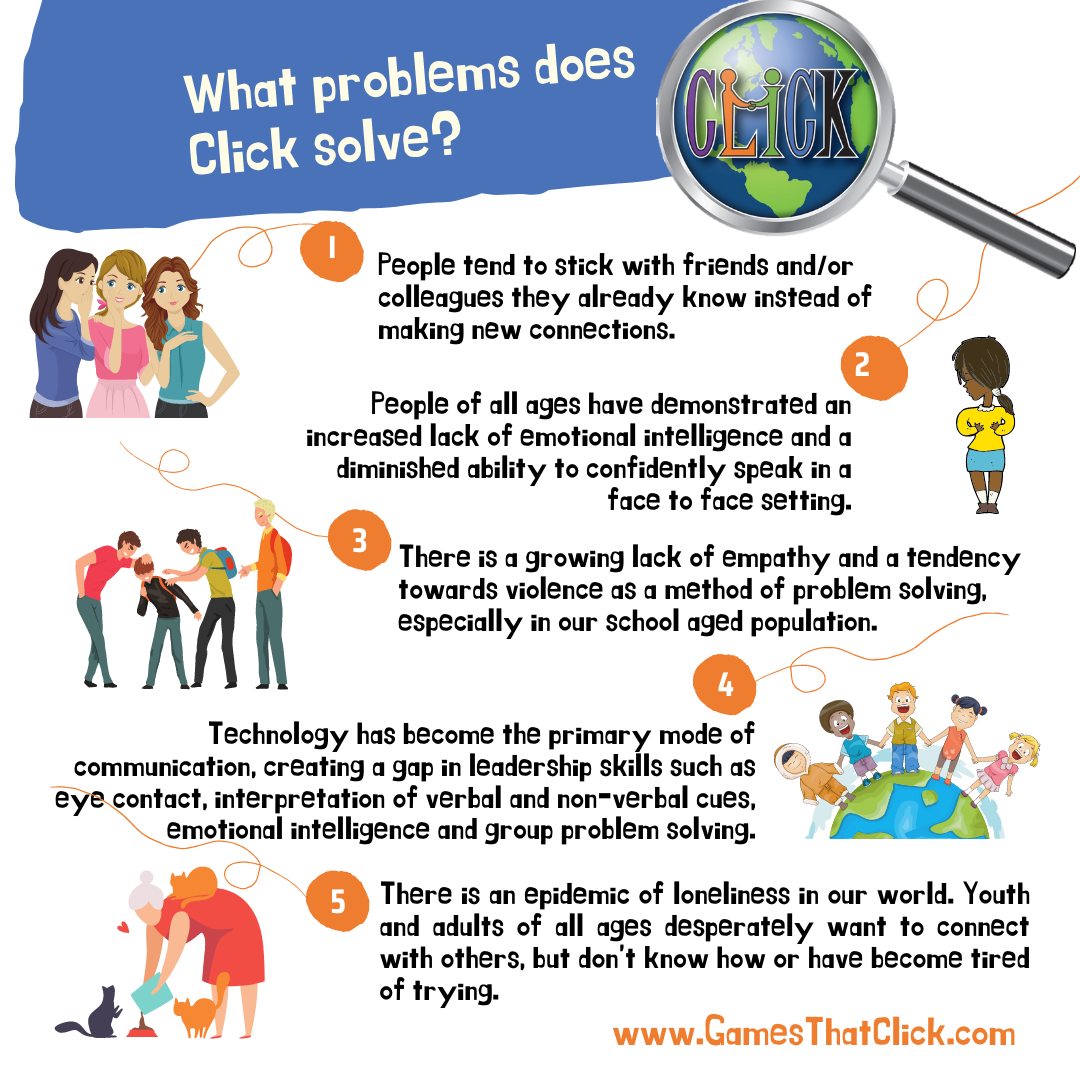Five problems = five ways that you can make a difference in your community! You can totally be a hero and do something about the lack of empathy, loneliness and divisiveness all around us. And you can do it in a super fun and non-threatening way!
Problem #1: People tend to stick with friends and/or colleagues they already know instead of making new connections.
Have you ever been to a networking event and then walked away having only spent time with people you already knew? Have you ever gone to a party and looked around and seen that people are sticking to the same few groups they always do instead of having a conversation with somebody new? Do you even wish sometimes that you could have the courage to talk to someone you've never talked to before? To have an uncomfortable conversation that helps you grow? We all have that insecurity on some level. It's so much easier to gravitate towards the people we know best (and those who share our beliefs and opinions). But when we do that we're missing an opportunity to connect with someone who can spark a new and creative idea within us or teach us how to love someone different from us.
As a teacher or leader in your community or workspace, YOU can set a example by intentionally connecting with someone you don't know each day.
Problem #2: People of all ages have demonstrated an increased lack of emotional intelligence and a diminished ability to confidently speak in a face to face setting.
Have you noticed that many people have difficulty conveying thoughts face to face and prefer texting and emailing? ESPECIALLY when it's a difficult conversation? The best way to overcome this is to purposely have conversations in person! It may be easier to send off a quick email, but since so much of what we are saying is communicated via body language, written messages can get misinterpreted. It's especially important to role model this for our younger generations!
As parents, we can create opportunities for our young people to interface with the public as much as possible. Have them place an order for carry out or be the one to speak up when something isn't right with their meal. They can also call someone on the phone and sign up for something or ask a company a question on behalf of themselves instead of having you do it for them. Although that's not face to face, tone of voice, pauses in conversation and inflection speak volumes and teach people how to infer things that are being communicated without actually being "said."
As business leaders we can encourage difficult conversations instead of putting them off. I'm not saying you should immediately have a conversation when you're feeling angry. Take a minute (or a day) to calm down, but make sure to vocalize your feelings (and encourage your team to do so) especially when the conversations are not easy. Letting things fester makes them worse and getting problems out in the open is the best way to solve them and work together.
With each face to face conversation, communication is a little easier and empathy is increased between the parties.
Problem #3: There is a growing lack of empathy and a tendency towards violence as a method of problem solving, especially in our school aged population.
This is so glaring in our world today. Instead of asking how someone feels, many of us assume the worst about them based upon physical characteristics, religion, friends they are associated with, where they live or a random comment on social media taken out of context. There is a growing level of unrest in our country. Anger with police. Anger with protesters. Anger in the classroom. Anger at politicians. And all of this anger manifests as violence in an effort to be seen and heard.
The solution to this is complicated. But, I firmly believe that one step in the right direction is to simply start a conversation and really LISTEN.
Click games have a unique approach to this. Every game has a "question of the game." JUST ONE. That means that every player answers the same question over and over. We often get asked if we can vary the questions, but this is done intentionally because it's not about YOUR story, it's about listening to everyone else's story. By sharing your own story over and over, you practice the art of story telling, but you grow less concerned about telling your own story and more interested in hearing the stories your new connections are sharing. Stories open a window into the life experiences of others, so invite the people you interact with each day to share a piece of their lives with you!
Problem #4: Technology has become the primary mode of communication, creating a gap in leadership skills such as eye contact, interpretation of verbal and non-verbal cues, emotional intelligence and group problem solving.
Let's face it; it's easier to "google" something than it is to ask someone else what their thoughts and ideas are. But, when we turn to technology for all of our solutions, we lose the opportunity to learn from the people in our business, school and social circles.
So much of emotional intelligence is developed through human interaction. Interpreting body language, sending calming signals through warm eye contact and simply appreciating and valuing diversity in teams, students and friendships is lost in online interactions. We've all had an email that we crafted just perfectly, only to have it completely misinterpreted by the recipient. I recently heard some important advice: If you send two emails and you still can't arrive at an answer, it's time to at least pick up the phone and have a verbal conversation if a face-to-face conversation isn't possible. Not only is a conversation more efficient, it's more personal as well.
It's important to make a concerted effort to allow your group opportunities to run into each other in person (like outdoor eating areas, break rooms and other social areas at work and school) to allow for the spontaneous solutions and meaningful relationships that form as a result of in-person collaboration.
Problem #5: There is an epidemic of loneliness in our world. Youth and adults of all ages desperately want to connect with others, but don't know how or have become tired of trying.
Just to give you some context about how important human connection is, it is the very next human need after food and water (#1) and safety (#2). So once you satisfy the things you actually need to stay *alive*, human connection is next on the list!
Loneliness was a problem before the Pandemic, but now even more so. Not only do people have a desperate desire to connect with others, they want permission to do so in a safe and level playing field. In direct opposition to this is the false sense of connectivity that social media offers us.
How can you work to heal this in your circles? You can create for your students, guests or team members opportunities to connect one on one in a non-threatening space. Even if they are hesitant at first to participate in group activities, they will be so happy that they did! We ALL have to fight against the desire to become wallflowers. Quarantining is especially difficult for extroverted people but introverts need human interaction as well (they just need a little bit of time to recover and be alone afterwards).
If you want something fun to level the playing field, Click is here for you! Check out any of our in-person games and enjoy the fun and laughter it brings to your group (no touching needed and it's totally fine to play social distance style 😊)

